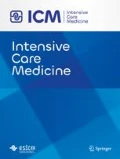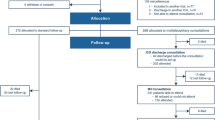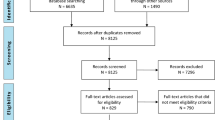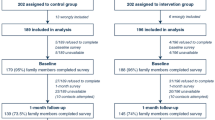Abstract
Purpose
To evaluate the impact of routine follow-up consultations versus standard of care for intensive care unit (ICU) survivors.
Methods
Systematic literature review from five databases (Cochrane CENTRAL, MEDLINE, EMBASE, PsycINFO, CINAHL), reference lists, citation tracking, and ongoing/unpublished trials. Randomized controlled trials investigating post-ICU consultations in adults with outcomes such as quality of life (QOL), anxiety, depression, posttraumatic stress disorder (PTSD), physical ability, cognitive function, and return to work were included. Two reviewers extracted data and assessed quality independently. The mean differences, risk ratios, and 95 % confidence intervals were calculated depending on outcome measures.
Results
From 1544 citations, five trials were included (855 patients). The overall risk of bias was low in two trials, unclear in two trials, and high in one trial. The overall quality of evidence was low. The trials assessed follow-up interventions defined as consultations informing survivors about their ICU stay. One trial found no effect on QOL. Pooling data from two trials (n = 374) showed a protective effect on risk of new onset PTSD at 3–6 months after ICU (risk ratio 0.49, 95 % CI 0.26–0.95). There was no effect on other outcomes.
Conclusions
The evidence indicates that follow-up consultations might reduce symptoms of PTSD at 3–6 months after ICU discharge in ICU survivors, but without affecting QOL and other outcomes investigated. This review highlights that planning of future RCTs should aim to standardize interventions and outcome measures to allow for comparisons across studies.





Similar content being viewed by others
References
Needham DM, Davidson J, Cohen H, Hopkins RO, Weinert C, Wunsch H, Zawistowski C, Bemis-Dougherty A, Berney SC, Bienvenu OJ, Brady SL, Brodsky MB, Denehy L, Elliott D, Flatley C, Harabin AL, Jones C, Louis D, Meltzer W, Muldoon SR, Palmer JB, Perme C, Robinson M, Schmidt DM, Scruth E, Spill GR, Storey CP, Render M, Votto J, Harvey MA (2012) Improving long-term outcomes after discharge from intensive care unit: report from a stakeholders’ conference. Crit Care Med 40:502–509
Angus DC, Carlet J (2003) Surviving intensive care: a report from the 2002 Brussels Roundtable. Intensive Care Med 29:368–377
Kiekkas P, Theodorakopoulou G, Spyratos F, Baltopoulos GI (2010) Psychological distress and delusional memories after critical care: a literature review. Int Nurs Rev 57:288–296
Jones C (2013) What’s new on the post-ICU burden for patients and relatives? Intensive Care Med 39:1832–1835
Davydow DS, Katon WJ, Zatzick DF (2009) Psychiatric morbidity and functional impairments in survivors of burns, traumatic injuries, and ICU stays for other critical illnesses: a review of the literature. Int Rev Psychiatry 21:531–538
Granja C, Amaro A, Dias C, Costa-Pereira A (2012) Outcome of ICU survivors: a comprehensive review. The role of patient-reported outcome studies. Acta Anaesthesiol Scand 56(9):1092–1103
Rattray JE, Hull AM (2008) Emotional outcome after intensive care: literature review. J Adv Nurs 64:2–13
Davydow DS, Gifford JM, Desai SV, Needham DM, Bienvenu OJ (2008) Posttraumatic stress disorder in general intensive care unit survivors: a systematic review. Gen Hosp Psychiatry 30:421–434
Oeyen SG, Vandijck DM, Benoit DD, Annemans L, Decruyenaere JM (2010) Quality of life after intensive care: a systematic review of the literature. Crit Care Med 38:2386–2400
Nesseler N, Defontaine A, Launey Y, Morcet J, Malledant Y, Seguin P (2013) Long-term mortality and quality of life after septic shock: a follow-up observational study. Intensive Care Med 39:881–888
Oeyen SG, Benoit DD, Annemans L, Depuydt PO, Van Belle SJ, Troisi RI, Noens LA, Pattyn P, Decruyenaere JM (2013) Long-term outcomes and quality of life in critically ill patients with hematological or solid malignancies: a single center study. Intensive Care Med 39:889–898
Jones C, Humphris GM, Griffiths RD (1998) Psychological morbidity following critical illness - the rationale for care after intensive care. Clin Intensive Care 9:199–205
Mehlhorn J, Freytag A, Schmidt K, Brunkhorst FM, Graf J, Troitzsch U, Schlattmann P, Wensing M, Gensichen J (2014) Rehabilitation interventions for postintensive care syndrome: a systematic review. Crit Care Med 42(5):1263–1271
Needham DM, Feldman DR, Kho ME (2011) The functional costs of ICU survivorship. Collaborating to improve post-ICU disability. Am J Respir Crit Care Med 183:962–964
Pattison NA, Dolan S, Townsend P, Townsend R (2007) After critical care: a study to explore patients’ experiences of a follow-up service. J Clin Nurs 16:2122–2131
Prinjha S, Field K, Rowan K (2009) What patients think about ICU follow-up services: a qualitative study. Crit Care 13:R46
Egerod I, Christensen D, Schwartz-Nielsen KH, Agard AS (2011) Constructing the illness narrative: a grounded theory exploring patients’ and relatives’ use of intensive care diaries. Crit Care Med 39:1922–1928
Storli SL, Lind R (2009) The meaning of follow-up in intensive care: patients’ perspective. Scand J Caring Sci 23:45–56
Engstrom A, Andersson S, Soderberg S (2008) Re-visiting the ICU experiences of follow-up visits to an ICU after discharge: a qualitative study. Intensive Crit Care Nurs 24:233–241
Griffiths JA, Barber VS, Cuthbertson BH, Young JD (2006) A national survey of intensive care follow-up clinics. Anaesthesia 61:950–955
Williams TA, Leslie GD (2008) Beyond the walls: a review of ICU clinics and their impact on patient outcomes after leaving hospital. Aust Crit Care 21:6–17
Egerod I, Risom SS, Thomsen T, Storli SL, Eskerud RS, Holme AN, Samuelson KA (2013) ICU-recovery in Scandinavia: a comparative study of intensive care follow-up in Denmark, Norway and Sweden. Intensive Crit Care Nurs 29:103–111
Rattray J, Crocker C (2007) The intensive care follow-up clinic: current provision and future direction? Nurs Crit Care 12:1–3
National Institute for Health and Clinical Excellence (UK) (2009) Rehabilitation after critical illness NICE clinical guidelines, no. 83. NICE, London
Jensen JF, Thomsen T, Overgaard D, Bestle MH, Christensen D, Egerod I (2014) Effect of ICU follow-up consultations versus standard care on quality of life and burden of symptoms: a systematic review and meta-analysis. European Society of Intensive Care Medicine, Annual Congress, Barcelona, Spain. ID. no: 1042. Abstract http://react-profile.org/Download/ESICM2014_Abstract_Book_final_version.pdf and e-poster, https://services.y-congress.com/mediatheque/app/esicm/results.html?channel=1&search=%7B%22Text%22%3A%22follow-up%22%7D&search_expr=follow-up¤t_section=poster&home_page_uri=posters.html. Accessed 1 Oct 2014
Liberati A, Altman DG, Tetzlaff J, Mulrow C, Gotzsche PC, Ioannidis JP, Clarke M, Devereaux PJ, Kleijnen J, Moher D (2009) The PRISMA statement for reporting systematic reviews and meta-analyses of studies that evaluate health care interventions: explanation and elaboration. J Clin Epidemiol 62:e1–e34
Higgins JPT, Green S (2013) Cochrane handbook for systematic review of interventions. The Cochrane Collaboration, Wiley, Chichester, pp 1–649
Jensen JF, Thomsen T, Overgaard D, Bestle MH, Christensen D, Egerod I (2014) Impact of follow-up consultations for ICU survivors on post-ICU syndrome: a systematic review and meta-analysis. PROSPERO: International prospective register of systematic reviews. CRD42013006644. http://www.crd.york.ac.uk/prospero/display_record.asp?ID=CRD42013006644. Accessed (commenced) 19 Aug 2013
Higgins JP, Altman DG, Gotzsche PC, Juni P, Moher D, Oxman AD, Savovic J, Schulz KF, Weeks L, Sterne JA (2011) The Cochrane Collaboration’s tool for assessing risk of bias in randomised trials. BMJ 343:d5928
Guyatt GH, Oxman AD, Kunz R, Vist GE, Falck-Ytter Y, Schunemann HJ (2008) What is “quality of evidence” and why is it important to clinicians? BMJ 336:995–998
National Center for PTSD, US Department of Veterans Affairs (2014) PDS:http://www.ptsd.va.gov/professional/assessment/adult-sr/pds.asp, PCL:http://www.ptsd.va.gov/professional/assessment/adult-sr/ptsd-checklist.asp. Accessed 14 Aug 2014
The Nordic Cochrane Centre. Review Manager 2012 (RevMan) [2] version 5.3. The Nordic Cochrane Centre, The Cochrane Collaboration, Copenhagen
Cuthbertson BH, Rattray J, Campbell MK, Gager M, Roughton S, Smith A, Hull A, Breeman S, Norrie J, Jenkinson D, Hernandez R, Johnston M, Wilson E, Waldmann C (2009) The PRaCTICaL study of nurse led, intensive care follow-up programmes for improving long term outcomes from critical illness: a pragmatic randomised controlled trial. BMJ 339:b3723
Douglas SL, Daly BJ, Kelley CG, O’Toole E, Montenegro H (2007) Chronically critically ill patients: health-related quality of life and resource use after a disease management intervention. Am J Crit Care 16:447–457
Holmes A, Hodgins G, Adey S, Menzel S, Danne P, Kossmann T, Judd F (2007) Trial of interpersonal counselling after major physical trauma. Aust N Z J Psychiatry 41:926–933
Jones C, Backman C, Capuzzo M, Egerod I, Flaatten H, Granja C, Rylander C, Griffiths RD (2010) Intensive care diaries reduce new onset post traumatic stress disorder following critical illness: a randomised, controlled trial. Crit Care 14:R168
Knowles RE, Tarrier N (2009) Evaluation of the effect of prospective patient diaries on emotional well-being in intensive care unit survivors: a randomized controlled trial. Crit Care Med 37:184–191
Tullai-McGuinness S, Madigan EA, Fortinsky RH (2009) Validity testing the outcomes and assessment information set (OASIS). Home Health Care Serv Q 28:45–57
Ely EW, Inouye SK, Bernard GR, Gordon S, Francis J, May L, Truman B, Speroff T, Gautam S, Margolin R, Hart RP, Dittus R (2001) Delirium in mechanically ventilated patients: validity and reliability of the confusion assessment method for the intensive care unit (CAM-ICU). JAMA 286:2703–2710
Pedersen AF, Zachariae R, Mainz J (2005) [Health-related quality of life as an outcome measure]. Ugeskr Laeger 167:4545–4549
Ware JE Jr, Sherbourne CD (1992) The MOS 36-item short-form health survey (SF-36). I. Conceptual framework and item selection. Med Care 30:473–483
Pedersen AP, Zachariae B (2003) Measurements of quality of life in health services—an introduction [Livskvalitetsmålinger i Sundhedsvæsenet, en introduktion]. The interpersonal relationships [De mellemmennskelige relationer]. Århus Amts Trykkeri, Århus, Denmark
Chrispin PS, Scotton H, Rogers J, Lloyd D, Ridley SA (1997) Short form 36 in the intensive care unit: assessment of acceptability, reliability and validity of the questionnaire. Anaesthesia 52:15–23
Shephard RJ, Franklin B (2001) Changes in the quality of life: a major goal of cardiac rehabilitation. J Cardiopulm Rehabil 21:189–200
Bindman AB, Keane D, Lurie N (1990) Measuring health changes among severely ill patients. The floor phenomenon. Med Care 28:1142–1152
Capuzzo M, Bianconi M (2015) Our paper 20 years later: 1-year survival and 6-month quality of life after intensive care. Intensive Care Med. doi:10.1007/s00134-015-3654-z
Jones C (2009) Commentary: Knowles RE, Tarrier N (2009). Evaluation of the effect of prospective patient diaries on emotional well-being in intensive care unit survivors: a randomized control trial. Nurs Crit Care 2009(14):155–156
Foa E, Hembree E, Rothbaum B (2007) Introductory information for therapists. In: Prolonged exposure therapy for PTSD: emotional processing of traumatic experiences therapist guide. Oxford University Press, Oxford, pp 1–23
Schnyder U (2014) Treating intrusions, promoting resilience: an overview of therapies for trauma-related psychological disorders. Eur J Psychotraumatol 5:26520
Bisson J, Andrew M (2007) Psychological treatment of post-traumatic stress disorder (PTSD). Cochrane Database Syst Rev CD003388
Pattison N, Dolan S (2009) Exploring patients’ experiences of a nurse-led follow-up service after critical care. Nurs Times 105:16–19
Glimelius PC, Bergbom I, Brodersen K, Ringdal M (2011) Patients’ participation in and evaluation of a follow-up program following intensive care. Acta Anaesthesiol Scand 55:827–834
Williams SL (2009) Recovering from the psychological impact of intensive care: how constructing a story helps. Nurs Crit Care 14:281–288
Aitken LM, Marshall AP (2015) Monitoring and optimising outcomes of survivors of critical illness. Intensive Crit Care Nurs 31:1–9
Agard AS, Lomborg K, Tonnesen E, Egerod I (2014) Rehabilitation activities, out-patient visits and employment in patients and partners the first year after ICU: a descriptive study. Intensive Crit Care Nurs 30:101–110
Deacon KS (2012) Re-building life after ICU: a qualitative study of the patients’ perspective. Intensive Crit Care Nurs 28:114–122
Hupcey JE (2000) Feeling safe: the psychosocial needs of ICU patients. J Nurs Scholarsh 32:361–367
Craig P, Dieppe P, Macintyre S, Michie S, Nazareth I, Petticrew M (2008) Developing and evaluating complex interventions: the new Medical Research Council guidance. BMJ 337:a1655
Ullman AJ, Aitken LM, Rattray J, Kenardy J, Le BR, MacGillivray S, Hull AM (2014) Diaries for recovery from critical illness. Cochrane Database Syst Rev 12:CD010468
Hernandez RA, Jenkinson D, Vale L, Cuthbertson BH (2014) Economic evaluation of nurse-led intensive care follow-up programmes compared with standard care: the practical trial. Eur J Health Econ 15:243–252
Aitken LM, Rattray J, Hull A, Kenardy JA, Le BR, Ullman AJ (2013) The use of diaries in psychological recovery from intensive care. Crit Care 17:253
Brummel NE, Girard TD, Ely EW, Pandharipande PP, Morandi A, Hughes CG, Graves AJ, Shintani A, Murphy E, Work B, Pun BT, Boehm L, Gill TM, Dittus RS, Jackson JC (2014) Feasibility and safety of early combined cognitive and physical therapy for critically ill medical and surgical patients: the activity and cognitive therapy in ICU (ACT-ICU) trial. Intensive Care Med 40:370–379
Brummel NE, Jackson JC, Girard TD, Pandharipande PP, Schiro E, Work B, Pun BT, Boehm L, Gill TM, Ely EW (2012) A combined early cognitive and physical rehabilitation program for people who are critically ill: the activity and cognitive therapy in the intensive care unit (ACT-ICU) trial. Phys Ther 92:1580–1592
Denehy L, Skinner EH, Edbrooke L, Haines K, Warrillow S, Hawthorne G, Gough K, Hoorn SV, Morris ME, Berney S (2013) Exercise rehabilitation for patients with critical illness: a randomized controlled trial with 12 months of follow-up. Crit Care 17:R156
Elliott D, McKinley S, Alison J, Aitken LM, King M, Leslie GD, Kenny P, Taylor P, Foley R, Burmeister E (2011) Health-related quality of life and physical recovery after a critical illness: a multi-centre randomised controlled trial of a home-based physical rehabilitation program. Crit Care 15:R142
Jackson JC, Mitchell N, Hopkins RO (2009) Cognitive functioning, mental health, and quality of life in ICU survivors: an overview. Crit Care Clin 25:615–628 x
Salisbury LG, Merriweather JL, Walsh TS (2010) The development and feasibility of a ward-based physiotherapy and nutritional rehabilitation package for people experiencing critical illness. Clin Rehabil 24:489–500
Ewens BA, Hendricks JM, Sundin D (2014) The use, prevalence and potential benefits of a diary as a therapeutic intervention/tool to aid recovery following critical illness in intensive care: a literature review. J Clin Nurs. doi:10.1111/jocn.12736
Long AC, Kross EK, Davydow DS, Curtis JR (2014) Posttraumatic stress disorder among survivors of critical illness: creation of a conceptual model addressing identification, prevention, and management. Intensive Care Med 40:820–829
Acknowledgments
The study was supported by grants from the Danish Nursing Organization, The Novo Nordisk Foundation and Nordsjællands Hospital, University of Copenhagen, Denmark. None of these had any influence on the design or conduct of the study; data collection, data management, analysis, and interpretation of the data; or the preparation, or approval of the manuscript. They are not responsible for the content in this review. We wish to thank all the experts and main authors in this field for their collaboration and response, and librarians A. Larsen and J. Meelby for their assistance with the search strategy.
Conflicts of interest
No conflicts of interest have been declared by the authors.
Author information
Authors and Affiliations
Corresponding author
Additional information
Review registration: Protocol registered at Centre for Reviews and Dissemination, University of York, International prospective register of systematic reviews (PROSPERO), ID: CRD42013006644, available from http://www.crd.york.ac.uk/prospero/display_record.asp?ID=CRD42013006644.
Take-home message: Follow-up consultations for intensive care recovery have been provided as experimental initiatives rather than by theory-driven standardized approaches. Therefore we need to evaluate the current evidence to inform future interventions and strategies.
Electronic supplementary material
Below is the link to the electronic supplementary material.
Rights and permissions
About this article
Cite this article
Jensen, J.F., Thomsen, T., Overgaard, D. et al. Impact of follow-up consultations for ICU survivors on post-ICU syndrome: a systematic review and meta-analysis. Intensive Care Med 41, 763–775 (2015). https://doi.org/10.1007/s00134-015-3689-1
Received:
Accepted:
Published:
Issue Date:
DOI: https://doi.org/10.1007/s00134-015-3689-1




